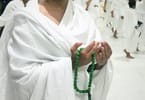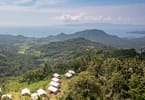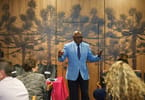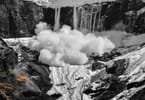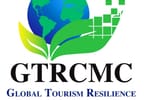Nigeria is Africa’s most populous country and the political and economic powerhouse of West Africa.
Home to 150 million people, this is a land of extremes: it is the world’s seventh largest exporter of oil, yet the oil wealth has not filtered down to the vast majority of the population, with 70 percent living below the poverty line, according to the CIA World Factbook.
The British Foreign and Commonwealth Office praises Nigeria’s “active civil society and free and vibrant press”, yet statistics for the health of its population make grim reading.
The CIA World Factbook estimates that 170,000 Nigerians a year die from HIV/AIDS, the world’s third highest number behind India and South Africa; life expectancy is the world’s ninth lowest at less than 47 years; and infant mortality is 11th highest in the world, at 9.4 percent of all live births.
As a country, Nigeria is a British colonial creation; formed in January 1914 by the amalgamation of three separate colonial territories.
Nigeria is blessed with hundreds of miles of coastline, national parks and fascinating ancient sites.
It gained independence from Britain 50 years ago on October 1, 1960. Since then the country has veered between civilian and military rule, with several coups, counter coups and one civil war (1967-1970).
Nigeria has now had civilian rule since 1999, its longest period so far, although the most recent elections in April 2007 were heavily criticized by foreign and domestic observers for poor organization and large-scale rigging, according to the UK’s Foreign and Commonwealth Office.
The election was won by Umaru Yar’Adua with 70 percent of the vote. He died in May 2010 after a long illness and was succeeded by his vice president Goodluck Jonathan. Elections are due to take place early next year.
The largest state in the south is Lagos with some 18 million people, according to the Lagos State government website. It was previously Nigeria’s capital before it was moved to Abuja in the center of the country. Lagos, however, is widely regarded as the country’s economic capital.
Half Nigeria’s population is Muslim, 40 percent is Christian and 10 percent have indigenous beliefs, according to CIA World Factbook. Although other sources such as the Pew Forum on Religion, put the number at 50.5 percent Muslim and 48.2 percent Christian.
The north of the country is largely Muslim, and the Christian population is centered in the south. Nigeria has more than 250 ethnic groups.
Twelve largely Muslim states in the north of the country introduced Sharia law in 1999, sparking tensions between Muslims and Christians and outbreaks of violence that left thousands dead, according to the FCO. It said punishments, including amputations, carried out by Sharia courts have caused international disquiet.
Nigeria has a tropical climate, a 900km coastline along the Atlantic Ocean and boundaries with Cameroon, Niger, Benin and Chad.
It has seven National Parks and two UNESCO World Heritage sites: Osun-Osogbo Sacred Grove and Sukur Cultural Landscape, both listed for their cultural importance.
Osun Sacred Grove is one of the last remaining primary high forests in southern Nigeria, regarded as the home of Osun, the goddess of fertility, to the Yoruba people. The area is dotted with sanctuaries, shrines, sculptures and art works dedicated to Osun and other gods.
The Sukur Cultural Landscape has the palace of a Hidi, or chief, terraced fields and the remains of a former flourishing iron industry, according to UNESCO.
Despite its scenic and historical attractions, beaches and abundant wildlife, Nigeria has remained largely off the tourist map.
The World Travel Guide, which describes itself as the “bible” of the travel industry, writes: “Nigeria is blessed with hundreds of miles of coastline, national parks and fascinating ancient sites. However, it is a shame that the country is not currently able to entice visitors other than those seeking a slice of the oil dollar.”
The Lonely Planet travel guide said: “We shouldn’t beat about the bush: Nigeria has an image problem. It dominates West Africa economically and politically, and has produced music and literature whose influence spreads far beyond the continent. But for all this clout, mention the country’s name to the person on the street and they’re more likely to come up with a litany of woe: corruption, ethnic violence and email scams. As a travel destination, Nigeria seems more a place to avoid than to book a flight to.”
The government is trying to give its tourist industry a push. The Nigerian Sunday Observer reported this September that the tourism minister Alhaji Abubakar Mohammed had stressed the need to develop tourism to improve the economy and was in the process of drawing up a master plan for attracting foreign visitors.
This could help wean the country off its reliance on oil to its economy.
The CIA World Factbook said: “The government continues to face the daunting task of reforming a petroleum-based economy, whose revenues have been squandered through corruption and mismanagement, and institutionalizing democracy.”
Some Nigerians who have made their mark on the world stage include Wole Soyinka, winner of the Nobel Prize for Literature in 1986, Ben Okri, winner of the 1991 Booker Prize, Chinua Achebe, nominated for the 1987 Booker Prize, musicians King Sunny Ade, the late Fela Kuti and NBA basketball player Hakeem Olajuwon.
WHAT TO TAKE AWAY FROM THIS ARTICLE:
- it is the world’s seventh largest exporter of oil, yet the oil wealth has not filtered down to the vast majority of the population, with 70 percent living below the poverty line, according to the CIA World Factbook.
- The Sukur Cultural Landscape has the palace of a Hidi, or chief, terraced fields and the remains of a former flourishing iron industry, according to UNESCO.
- However, it is a shame that the country is not currently able to entice visitors other than those seeking a slice of the oil dollar.



